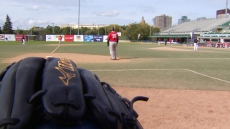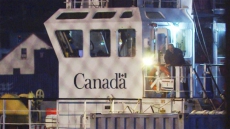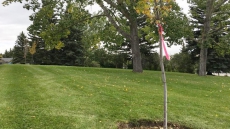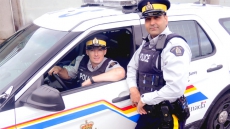VANCOUVER — The first flakes are falling in parts of the Lower Mainland and snow has already begun to blanket southern Vancouver Island, heralding the arrival of a winter storm forecasters expect to wallop the region over the coming days
Environment Canada is predicting between 10 and 25 centimetres of snow on B-C's south coast and the Island for today and into the weekend.
The weather agency is also calling for especially chilly temperatures along sections of the north and central coasts, with cold air and strong winds expected to make it feel like -20 C in the morning.
Between 10 and 20 centimetres of snow is forecast for Metro Vancouver, though only one centimetre fell overnight.
The provincial government says it may be forced to shut down two of the Lower Mainland's main bridges if workers are unable to prevent ice from forming on the structures' cables and falling on passing vehicles.
Monday saw dozens of vehicles damaged by so-called ice bombs, leading to 80 insurance claims, and prompting a pledge from the province to cover the deductible.
TRAVEL CANCELLATIONS AND POSSIBLE DELAYS
Harbour Air cancelled all of its flights until 11 a.m. due to the weather. Customers can call 1.800.665.0212 for more information. Some airlines have also cancelled flights out of Vancouver International Airport and travelers are asked to check the status of their flight before heading out. There are 80 different snow clearing machine standing by if they are needed.
Workers will also be watching the Alex Fraser and Port Mann bridges in case of falling ice.
Ray Kerr with the City of Surrey said workers are prepared to ensure road safety.
“All the staff are on rotating 12 hour shifts,” he said. “And we'll work straight through until road conditions are good.”
School closures
All schools in Comox Valley School District 71
Vancouver’s Blessed Sacrament Elementary School, St. Anthony Padua Elementary School, Eaton Arrowsmith School, Vancouver College High School, Saint Francis Xavier Elementary, St. Patrick Regional Secondary
Surrey’s Our Lady of Good Counsel School and Surrey Christian School
Abbotsford’s St. John Brebeuf School and St. James and St. Ann’s Elementary School
Tsawwassen’s Southpointe Academy
Burnaby’s St. Thomas More Collegiate, John Knox Christian School and Absorbent Minds Montessori pre-school
Chilliwack's St. Mary's Elementary
Delta's Immaculate Conception School
Langley's Kings School, Credo Christian Elementary, Langley Christian School and William of Orange Christian School
Maple Ridge's James Cameron Elementary School and Maple Ridge Christian School
Port Coquitlam's Archbishop Carney High School and Hope Lutheran Christian School
WINTER STORM PREPAREDNESS AND SAFETY TIPS
Environment Canada has issued special weather advisories for several regions of the province for extremely cold temperatures and arctic outflows causing strong winds combined with snowfall.
The Minister of State for Emergency Preparedness Naomi Yamamoto is encouraging British Columbians to prepare with the following tips and resources:
Winter Weather Readiness Tips
Arctic outflow warnings are issued when bitterly cold winds that can create wind chill values of -20 or less for six hours or more are forecast. In these conditions, people should limit outdoor exposure or use caution due to the increased risk for frostbite and hypothermia. Be particularly mindful of children and pets being outdoors at this time.
Always wear clothing appropriate for the weather. Dress warmly in layers with a wind resistant outer layer. Synthetic and wool fabrics provide better insulation. Some synthetic fabrics are designed to keep perspiration away from your body which keep you dry and further reduce your risk. Cover as much exposed skin as possible to avoid frostbite by wearing hats, gloves and scarves. Be sure to cover your nose to protect it. Try to stay dry. If you get wet, change into dry clothing as soon as possible. You lose heat faster when you're wet.
Drive with care. Strong winds combined with snow can significantly reduce visibility. Drivers should monitor DriveBC road conditions and have an emergency kit in their vehicles that includes warm clothes and winter footwear, food and water, a shovel, a flashlight, and a fully-charged cell phone for emergency calls.





